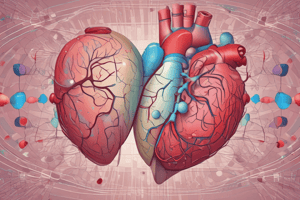Podcast
Questions and Answers
What is the primary function of beta blockers in the body?
What is the primary function of beta blockers in the body?
- To increase the release of renin, an enzyme that raises blood pressure
- To block the effects of epinephrine and norepinephrine on the heart and blood vessels (correct)
- To increase the heart rate and force of contraction
- To lower blood pressure and increase the risk of heart disease
Which of the following is a common side effect of beta blockers?
Which of the following is a common side effect of beta blockers?
- Improved respiratory function
- Increased heart rate
- Fatigue (correct)
- High blood pressure
Which type of beta blocker affects only the beta-1 receptors in the heart?
Which type of beta blocker affects only the beta-1 receptors in the heart?
- Calcium channel blockers
- Non-selective beta blockers
- Alpha blockers
- Selective beta blockers (correct)
What is a contraindication for the use of beta blockers?
What is a contraindication for the use of beta blockers?
Which of the following is a less common side effect of beta blockers?
Which of the following is a less common side effect of beta blockers?
What is the name of the enzyme that beta blockers decrease the release of?
What is the name of the enzyme that beta blockers decrease the release of?
Which of the following conditions is beta blockers used to treat?
Which of the following conditions is beta blockers used to treat?
What is the name of the type of beta blocker that affects both beta-1 and beta-2 receptors?
What is the name of the type of beta blocker that affects both beta-1 and beta-2 receptors?
Flashcards are hidden until you start studying
Study Notes
What are Beta Blockers?
- A type of medication used to treat various conditions, primarily related to the heart and blood vessels
- Also known as beta-adrenergic blocking agents
Mechanism of Action
- Block the effects of epinephrine (adrenaline) and norepinephrine on the heart and blood vessels
- Reduce the heart rate and force of contraction, thereby lowering blood pressure
- Decrease the release of renin, an enzyme that raises blood pressure
Uses
- Hypertension: to lower blood pressure and reduce the risk of heart disease, stroke, and kidney disease
- Angina: to reduce the frequency and severity of angina attacks
- Heart failure: to improve symptoms and reduce the risk of death
- Arrhythmias: to control abnormal heart rhythms
- Migraines: to prevent and treat migraines
- Anxiety: to reduce symptoms of anxiety and performance anxiety
Types of Beta Blockers
- Selective beta blockers: affect only the beta-1 receptors in the heart, reducing the risk of bronchospasm and other side effects
- Examples: metoprolol, atenolol, bisoprolol
- Non-selective beta blockers: affect both beta-1 and beta-2 receptors, increasing the risk of bronchospasm and other side effects
- Examples: propranolol, timolol, nadolol
Side Effects
- Common: fatigue, dizziness, cold hands and feet, sleep disturbances
- Less common: slow heart rate, low blood pressure, bronchospasm, mental health changes
- Rare: heart failure, worsening of asthma or COPD, allergic reactions
Contraindications
- Uncontrolled heart failure: beta blockers can worsen heart failure
- Asthma or COPD: beta blockers can worsen respiratory conditions
- Pregnancy and breastfeeding: use with caution, as the effects on the fetus or baby are not well understood
- Allergic reactions: to beta blockers or any of their components
What are Beta Blockers?
- Beta blockers are a type of medication used to treat various conditions, primarily related to the heart and blood vessels
- They are also known as beta-adrenergic blocking agents
Mechanism of Action
- Block effects of epinephrine (adrenaline) and norepinephrine on heart and blood vessels
- Reduce heart rate and force of contraction, lowering blood pressure
- Decrease release of renin, an enzyme that raises blood pressure
Uses
- Treat hypertension to lower blood pressure and reduce risk of heart disease, stroke, and kidney disease
- Reduce frequency and severity of angina attacks
- Improve symptoms and reduce risk of death in heart failure
- Control abnormal heart rhythms (arrhythmias)
- Prevent and treat migraines
- Reduce symptoms of anxiety and performance anxiety
Types of Beta Blockers
- Selective beta blockers affect only beta-1 receptors in the heart, reducing risk of bronchospasm and side effects
- Examples: metoprolol, atenolol, bisoprolol
- Non-selective beta blockers affect both beta-1 and beta-2 receptors, increasing risk of bronchospasm and side effects
- Examples: propranolol, timolol, nadolol
Side Effects
- Common side effects: fatigue, dizziness, cold hands and feet, sleep disturbances
- Less common side effects: slow heart rate, low blood pressure, bronchospasm, mental health changes
- Rare side effects: heart failure, worsening of asthma or COPD, allergic reactions
Contraindications
- Uncontrolled heart failure: beta blockers can worsen heart failure
- Asthma or COPD: beta blockers can worsen respiratory conditions
- Pregnancy and breastfeeding: use with caution, as effects on fetus or baby are not well understood
- Allergic reactions: to beta blockers or any of their components
Studying That Suits You
Use AI to generate personalized quizzes and flashcards to suit your learning preferences.




